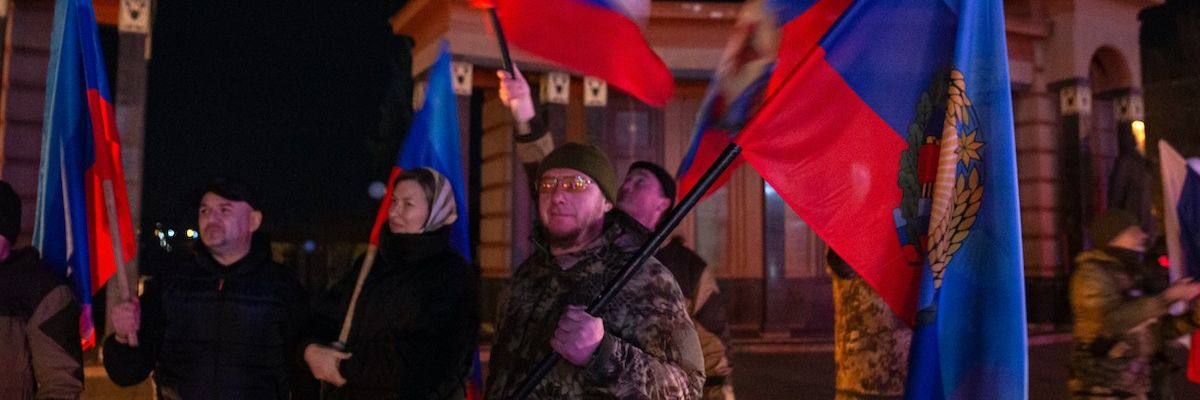Russia’s official recognition of the separatist Donetsk and Lugansk republics is both illegal under international law and acutely unhelpful politically, and makes a diplomatic resolution of the existing crisis even less likely.
The Minsk II process for a resolution of the Donbas conflict is now dead — though to be fair, the Ukrainian government had long since made clear that it had no intention of implementing its basic provisions (on autonomy for the Donbas), and the West had made clear that it had no intention of pressuring Ukraine to do so.
The real question however is what Russia does next. In itself, this Russian action changes nothing in practical terms. These areas of the Donbas have been separate from Ukraine, with Russian backing, since 2014, and intermittent fighting has been ongoing since then. Western sanctions are already in place to punish Russia for this.
So far, the Russian recognition of the Donbas republics is a very different matter indeed from the full-scale invasion of the whole of Ukraine against which Washington and NATO have warned, and which the “Defend Ukraine Sovereignty” sanctions bill before the U.S. Congress today is intended to deter. Such an invasion would be a vastly greater violation of international law, and would lead to a vastly greater and more dangerous conflict. It could be compared to a scenario in which, rather than invading part of Cyprus in 1974, Turkey had occupied the whole of Cyprus, or even Greece itself. Such an invasion, if God forbid it occurs, should meet with the harshest possible Western economic and political response.
Parts of President Putin’s speech announcing the recognition of the Donbas clearly threatened such a wider invasion. In recent days, Russia has been initiating new military clashes in the Donbas and blaming them on the Ukrainians. It remains to be seen whether this is intended to put additional pressure on the West to reach agreements on arms control and NATO membership, or whether the decision to invade has already been taken and Russia is now manufacturing the excuse to do so.
There can also be different levels of military action. A Russian seizure of the whole of Ukraine, as imagined by Washington, seems inherently unlikely. An occupation of Russian-speaking areas of eastern and southern Ukraine is much more plausible. It may also be, however, that Russia will content itself with inflicting a limited local defeat on Ukrainian forces in the Donbas, by way of illustrating NATO’s inability to help Ukraine, followed perhaps by a pause to see what the West does next.
This would fall far short of invasion. It would mark only a limited escalation in the conflict that has been going on in the Donbas since 2014. It therefore remains critically important that we should keep the threat of full-scale sanctions in hand in order to deter Russia from full-scale invasion. If we impose full sanctions now, we will have no more economic ammunition to use, and Russia would have nothing to lose by widening the war.
For as the Biden administration, NATO and all NATO members have declared, we are not going to fight to defend Ukraine. Economic pressure on Russia is therefore the only powerful lever we have to influence Russian actions. This Western refusal to fight also makes the idea of Ukrainian NATO membership inherently absurd. Nobody in the West is — quite rightly — going to risk the nuclear annihilation of mankind for the sake of the international orientation of Ukraine.
We should however be equally clear that if — as parts of Putin’s speech suggest may prove the case — Russia does in fact extend the war beyond the Donbas to the rest of Ukraine, then the West would quite rightly regard this as a very grave crime, the full range of sanctions envisioned in the bill before Congress should indeed be imposed, and all Western states should support them.
In the meantime, we should continue to urge the Ukrainian government to take no military action in the Donbas that could help give Russia the pretext for invasion. The West in the past was grossly irresponsible in suggesting a Western military commitment to Ukraine that does not in fact exist. We should not compound this by encouraging any further risk-taking by Ukrainians. Western politicians who encourage a hard Ukrainian line should remind themselves that it is not they who will be risking their lives in the event of war.
The Russian recognition of the Donbas republics, though deeply regrettable, should also not prevent us from continuing to pursue negotiations with Russia towards new arms control agreements, in an effort to reach agreement with Russia on these issues and help prevent a Russian invasion of Ukraine.
As long as such an invasion has not yet taken place, the meeting between Anthony Blinken and Sergei Lavrov this week should therefore still go ahead, and American condemnation of Russia’s latest action should be accompanied by continued efforts at compromise with Russia on these aspects of Putin’s speech. Of course, any new arms control agreements would have to be mutual and reciprocal, and to include the withdrawal of all the new Russian forces deployed around the borders of Ukraine in recent months.
Indeed, the latest events are a further demonstration of the need to renegotiate European security arrangements to place them on a more sustainable and peaceful basis. War between nuclear-armed powers is not an option.
Russia’s action has narrowed the space for diplomacy to resolve this crisis, but not yet destroyed it. As long as there is any hope of preventing a wider war, it is our duty to pursue it, both by the genuine and credible threat of massive economic sanctions, and by the genuine and sincere offer of reasonable compromise.














